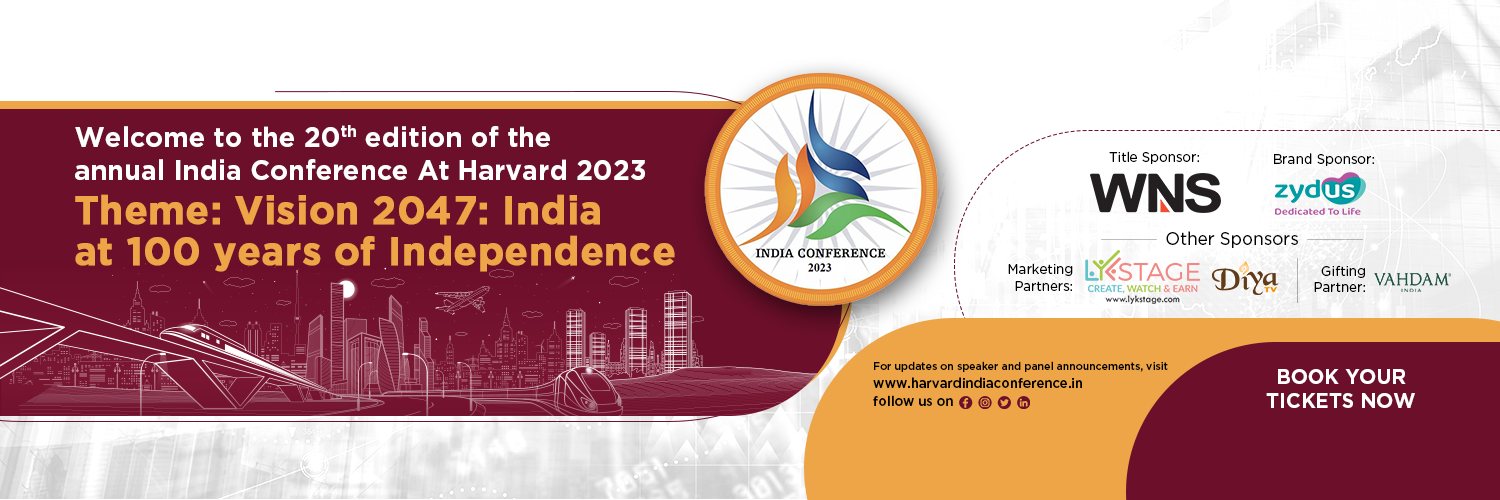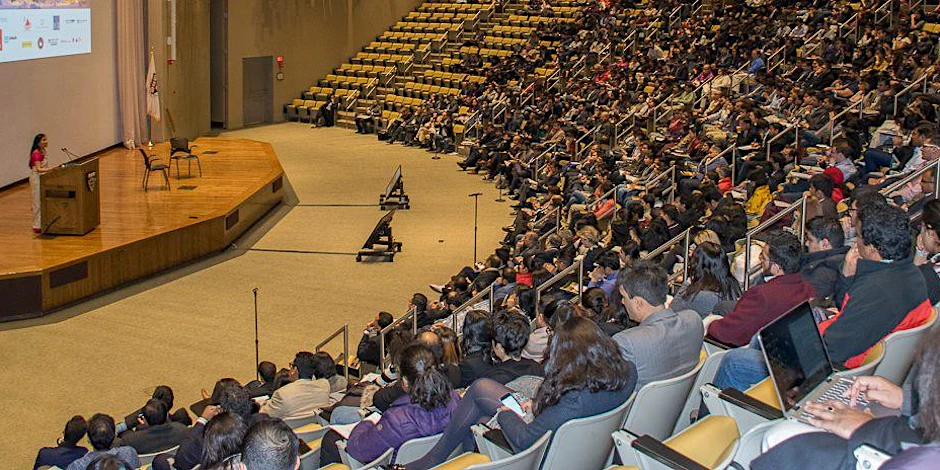
This year marks the 20th season of the India Conference at Harvard. The conference, organized by students from across Harvard, will run February 11 and 12 at Harvard Kennedy School and Harvard Business School. The conference theme, “Vision 2047: India at 100 Years of Independence” will explore how India can fulfill her global potential. The conference hopes to build upon its strong legacy of hosting conversations with India’s leading politicians, business leaders, government officials, academics, artists, athletes, philanthropists for meaningful dialogue on India’s path to global recognition. The conference is supported by WNS, with additional contributions from Zydus and the Mittal Institute.
We spoke with conference organizers Anushree Singh (Harvard Business School), Dhananjay Goel (Harvard Kennedy School), Harkirat Bhullar (Harvard College), Umang Daga (Harvard Business School), and Vidhi Lohia (Harvard Kennedy School) about what attendees can expect from the two-day event.
Mittal Institute: Thank you all for speaking with us! Why was it important for you to get involved in carrying on the legacy of this long-running conference?
India Conference Team: In a nutshell, all of us are passionate about creating an informed narrative around India. We believe the country is at a critical moment in its development journey, and the India conference serves to unpack, for students and professionals alike, the opportunities and risks that the country faces. The voices amplified by the conference are heard across the globe, and we hope this platform can help leave an impact on the economic, policy, and cultural conversations.
Mittal Institute: You hail from across Harvard – making the conference coordination quite interdisciplinary in nature. What are the benefits of having such an organizing team, and how did you coordinate such a diverse array of speakers?
India Conference Team: The diverse team is our superpower as a conference. The diversity enables the wide range of panels, which the conference seeks to deliver. For instance, students from Harvard Law School are driving conversation on criminal justice while students from the Harvard Graduate School of Design are conducting a discussion on urban planning. Similarly, graduate students in medicine, education, policy, and business have come together to shape conversations in their area of expertise. The diverse array of speakers is a direct consequence of a diverse array of students.
Additionally, the diversity in our team enables us to drive conversations at the intersection of various fields. For instance, we have a panel on tech regulation in India, which is driven by a team consisting of graduate students in law, policy, and business. This helps shape a truly impactful agenda and generates insight by taking a multi-faceted lens to major issues.
The diversity in our team enables us to drive conversations at the intersection of various fields … This helps shape a truly impactful agenda and generates insight by taking a multi-faceted lens to major issues.
Mittal Institute: Can you give us a preview of some of the panels? What types of topics can conference attendees look forward to?
India Conference Team: Under the umbrella theme of “Vision 2047: India at 100 years of Independence,” the conference seeks to address topics across three broad buckets: economic, policy, and cultural.
The first day of the conference, held at the Kennedy School, will see detailed discussions on several culture and policy subjects, such as the state of Indian democracy, the roadmap for climate justice, and India’s approach to foreign policy.
The second day, held at the Business School, will lean heavily into India’s economic story, touching on the dream for a trillion dollar digital economy, the latest in India’s investment landscape, and unpacking growth areas such as EVs, pharmaceuticals, and climate tech.

A previous India Conference at Harvard.
Mittal Institute: As India celebrates its 75 years of independence, and looks ahead to the next 25 years, what are some major themes you think India should focus on?
India Conference Team: We believe that India must charter a sustainable growth path built on the idea of balance between its economic, political, social, and cultural forces. GDP growth must be accompanied by social reform and cultural preservation. This is key to ensuring that we progress in an inclusive, and thereby sustainable manner.
Mittal Institute: In your mind, what is the most compelling reason for attendees to register for the conference?
India Conference Team: Our website features a quote from Jeff Bezos, “I predict that the 21st century is going to be the Indian century.” The country is having a breakout moment, economically and geopolitically. We believe the conference is a great way for attendees to build an actionable sense of what this India story is all about.
We hope to address questions like – How to differentiate between the hype and the fundamentals? Who are the winners and losers in the India story? What do I need to know about the culture and political narrative? How does the rise of India change the global power structure? What policies and insights are important for me?
It’s also a great opportunity to network with like-minded peers who have a deep interest in India and the South Asian region!
Mittal Institute: What are your plans post-conference? Do you anticipate building upon the dialogue from the conference?
India Conference Team: We plan to use our social media platforms to keep the conversation moving on several important themes the conference touches upon. The conference teams also work closely with India affinity groups at Harvard to conduct several small-scale conversations through the course of the academic year!
For updates on speaker and panel announcements, and locations, please visit follow the India Conference at Harvard on Instagram, Facebook, Twitter and LinkedIn.
